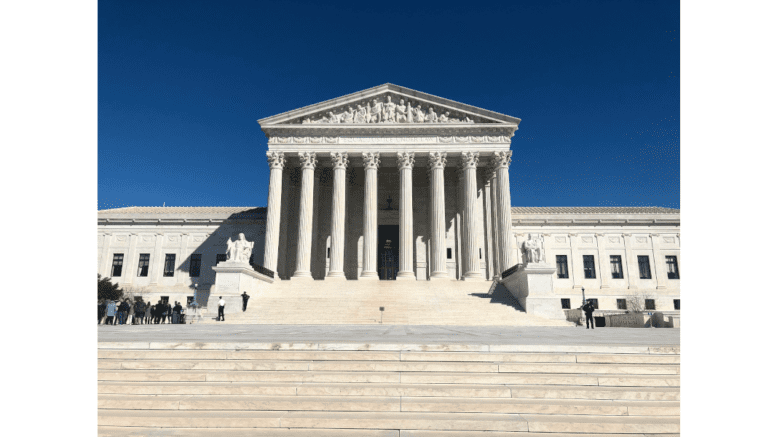by Ashley Murray, Georgia Recorder [This article first appeared in the Georgia Recorder, republished with permission]
July 20, 2023
WASHINGTON — The Senate Committee on the Judiciary on Thursday approved a proposal to impose a code of ethics for the U.S. Supreme Court, amid revelations that justices failed to disclose luxury travel and real estate deals, as well as directing staff to promote book sales.
The panel split along party lines, in an 11-10 vote, to send the Supreme Court Ethics, Recusal and Transparency Act to the Senate floor.
The proposal, sponsored by Rhode Island Democratic Sen. Sheldon Whitehouse, would establish new conflict of interest rules for Supreme Court justices and the federal judiciary at large.
If passed by the upper chamber, the bill would also compel the court to establish a publicly available code of conduct and an official complaint procedure, among other transparency measures including requiring minimum gift, travel and income disclosures.
“Unlike every other federal official, Supreme Court justices are not bound by a code of ethical conduct,” Chair Dick Durbin of Illinois said in his opening statement. “They are the most powerful judges in America and yet, they are not required to follow even the most basic ethical standards. The SCERT Act we’re considering would change that.”
Republicans on the committee criticized the bill as “harassing and intimidating to the court,” as Sen. Chuck Grassley of Iowa said in his opening remarks.
Ranking member Lindsey Graham of South Carolina said the legislation is an effort to “delegitimize” the court.
“The bottom line is this is a bill not designed to make the court stronger or ethical. It’s a bill to destroy a conservative court,” Graham said at the outset of the markup. “This is a bill to create a situation where conservative judges can be disqualified by statute. It’s a bill to rearrange the makeup of how the court governs itself.”
Durbin countered that argument by entering into the record a letter that he wrote to Chief Justice John Roberts in 2012 urging the court to establish a code of ethics. The court at the time was often split along ideological lines, with Justice Anthony Kennedy a swing vote.
Members of the Democrat-led Judiciary Committee who supported the legislation included Durbin, Dianne Feinstein of California, Whitehouse, Amy Klobuchar of Minnesota, Chris Coons of Delaware, Richard Blumenthal of Connecticut, Mazie Hirono of Hawaii, Cory Booker of New Jersey, Alex Padilla of California, Jon Ossoff of Georgia and Peter Welch of Vermont.
The GOP minority members on the panel who voted no were Graham, Grassley, John Cornyn of Texas, Mike Lee of Utah, Ted Cruz of Texas, Josh Hawley of Missouri, Tom Cotton of Arkansas, John Kennedy of Louisiana, Thom Tillis of North Carolina and Marsha Blackburn of Tennessee.
Republican amendments rejected
Seven GOP amendments failed in party line votes during the roughly three-hour markup, including:
Graham’s proposal to expand Supreme Court police jurisdiction to investigate threats or attacks against the justices at their homes.
Cornyn’s amendment to codify a federal right for federal judges to carry concealed firearms.
Cruz’s proposal to cap the Supreme Court bench at nine justices.
Cotton’s amendment to require any news media covering the court to publicly list its funders and to mandate that journalists swear under oath not to report any draft opinions or other non-public information without the court’s authorization.
Kennedy’s amendment to “simply condemn the racist things that have been said about Justice Clarence Thomas,” as he said, passed in a 21-0 vote after Durbin inserted language to expand the censure to any racist language against any of the justices.
Senate Majority Leader Chuck Schumer said Thursday he supports the legislation and will help it progress in the upper chamber, where Democrats hold a thin majority.
“It’s time for the highest court in the land to be held to the highest ethical standards. Today’s markup reaffirms Senate Democrats’ commitment to rebuild our country’s faith in our judiciary and reestablish legitimacy in our courts. We must ensure that the Supreme Court is not in the pocket of the ultra-wealthy and MAGA extremists,” Schumer said in a statement Thursday following the committee’s approval of the bill.
Kennedy called the bill “dead as fried chicken on the Senate floor, dead as fried chicken in the House.”
The bill is unlikely to advance in the Republican-led House.
Ethics questions
Among the latest incidents uncovered by journalists is that Justice Sonia Sotomayor allegedly directed taxpayer-funded court staff to schedule speaking engagements related to her literary work and pitch sales of the justice’s books, according to reporting by The Associated Press.
Through more than 100 public records requests, the AP uncovered details about the court staff’s involvement in promoting Sotomayor’s memoir and children’s books — from which the justice has earned roughly $3.7 million.
The report also found that Sotomayor did not recuse herself from matters that her publisher, Penguin Random House, had before the court.
In April, ProPublica chronicled years of private jet and yacht excursions on the dime of billionaire Republican donor Harlan Crow that Thomas never disclosed. The nonprofit investigative outfit also revealed that Thomas did not disclose a real estate transaction with Crow.
Following the ProPublica revelations, Politico reported that Justice Neil Gorsuch did not identify the purchaser who bought a 40-acre plot in Colorado co-owned by the justice — a sale from which he made between $250,001 and $500,000, according to federal disclosure forms. The purchaser turned out to be attorney Brian Duffy of the law firm Greenberg Traurig that has since argued numerous cases in front of the court.
The spring revelations set in motion a series of hearings by the Senate Committee on the Judiciary and its subcommittees.
Roberts was invited to but declined to attend the first of the hearings in early May.
In response to the invitation, Roberts wrote in a letter to the panel’s Democratic majority that there are “no set rules” for the court’s adoption of such principles or guidelines. He attached to his response a “Statement on Ethics Principles and Practices” co-signed by all fellow justices.
Georgia Recorder is part of States Newsroom, a network of news bureaus supported by grants and a coalition of donors as a 501c(3) public charity. Georgia Recorder maintains editorial independence. Contact Editor John McCosh for questions: info@georgiarecorder.com. Follow Georgia Recorder on Facebook and Twitter.



